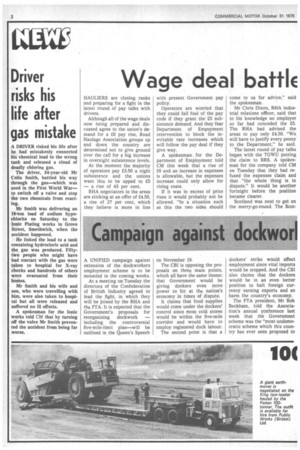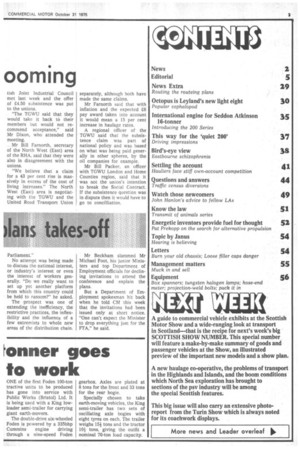Wage deal battle
Page 4

Page 5

If you've noticed an error in this article please click here to report it so we can fix it.
ooming
HAULIERS are closing ranks and preparing for a fight in the latest round of pay talks with drivers.
Although all of the wage deals now being prepared and discussed agree to the union's demand for a £6 pay rise, Road Haulage Association groups up and down the country are determined not to give ground over the call for a big increase in overnight subsistence levels.
At the moment the majority of operators pay £3.50 a night subsistence and the unions want this to be upped to £5 — a rise of 43 per cent.
RHA negotiators in the areas are sticking at an offer of £4.50, a rise of 27 per cent, which they believe is more in line with present Government pay policy.
Operators are worried that they could fall foul of the pay code if they grant the £5 subsistence demand. And they fear Department of Empoyment intervention to block the inevitable rate increases which will follow the pay deal if they give way.
A spokesman for the Department of Employment told CM this week that a rise of £6 and an increase in expenses is allowable, but the expenses increase could only allow for rising costs.
If it was in excess of price rises it would probably not be allowed. "In a situation such as this the two sides should come to us for advice," said the spokesman.
Mr Chris Dixon, RHA industrial relations officer, said that to his knowledge no employer so far had conceded the £5. The RHA had advised the areas to pay only £4.50. "We will have to justify every penny to the Department," he said.
The latest round of pay talks began with the TGWU putting the claim to BRS. A spokesman for the company told CM on Tuesday that they had refused the expenses claim and that "the whole thing is in dispute." It would be another fortnight before the position became clearer.
Scotland was next to get on the merry-go-round. The Scot tish Joint Industrial Council met last week and the offer of £4.50 subsistence was put to the unions.
"The TGWU said that they would take it back to their members but would not recommend acceptance," said Mr Dixon, who attended the meeting.
Mr Bill Farnorth, secretary of the North West (East) area of the RHA, said that they were also in disagreement with the unions.
• "We believe that a claim for a 43 per cent rise is massively in excess of the cost of living increases." The North West (East) area is negotiating with the TGWU and the United Road Transport Union separately, although both have made the same claims.
Mr Farnorth said that with inflation and the expected £6 pay award taken into account it would mean a 15 per cent increase in haulage rates.
A regional officer of the TGWU said that the subsistence claim was part of national policy and was based on what was being paid generally in other spheres, by the oil companies for example.
Mr Bill Packer, an officer with TGWU London and Home Counties region, said that it was not the union's intention to break the Social Contract. If the subsistence question was in dispute then it would have to go to concilliation.
































































































